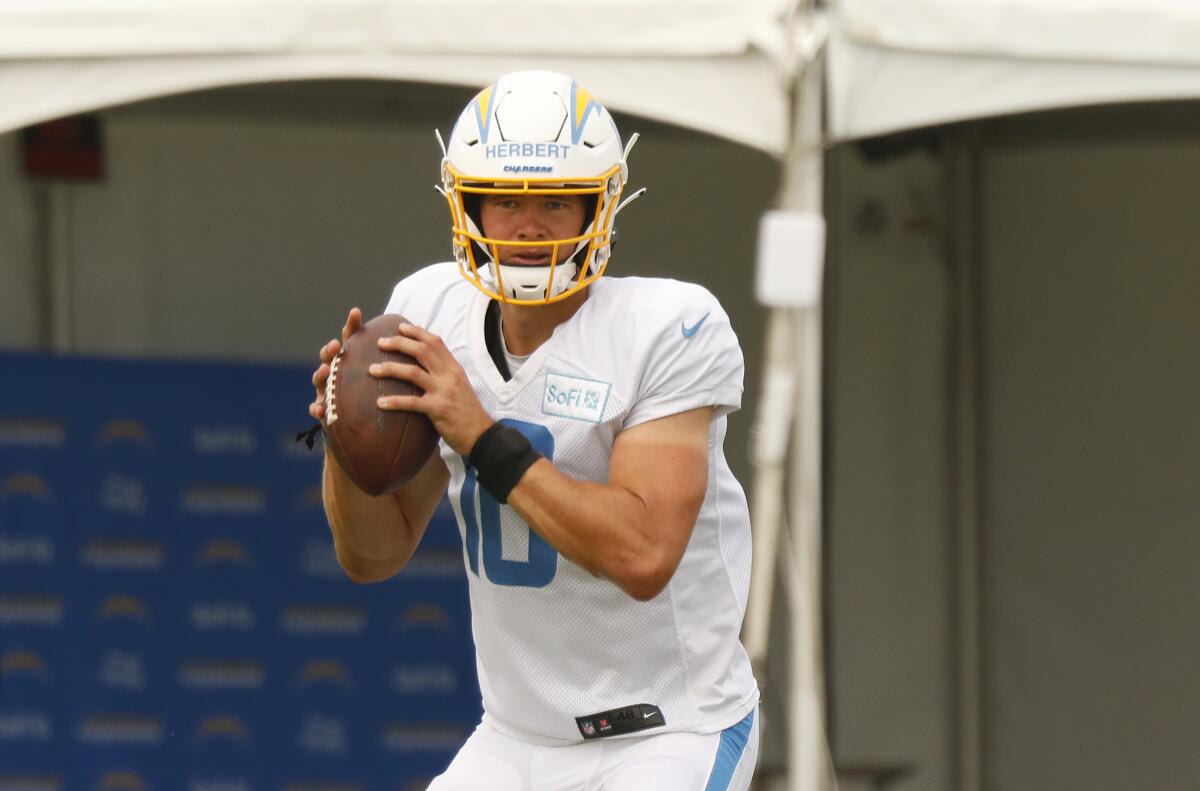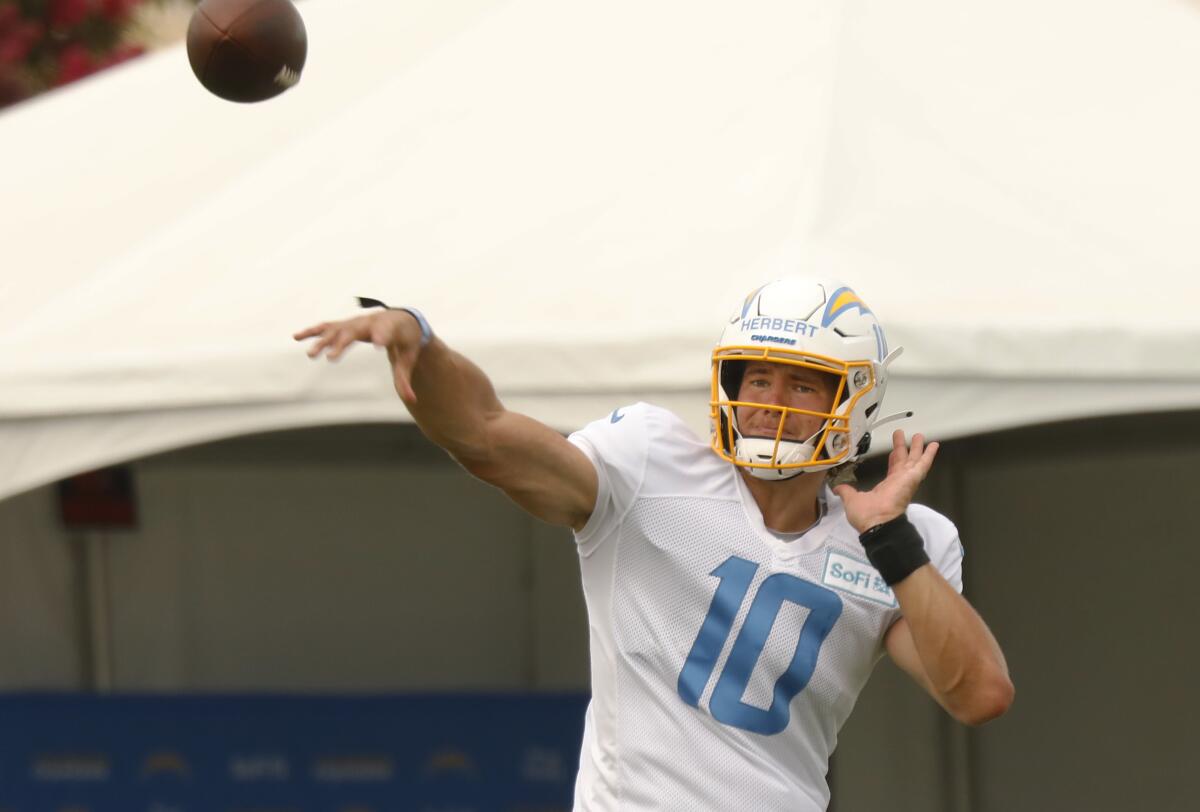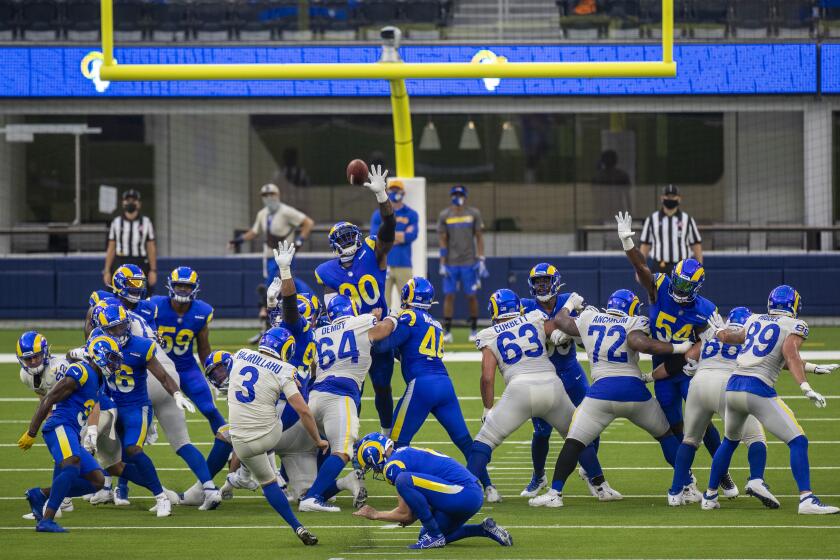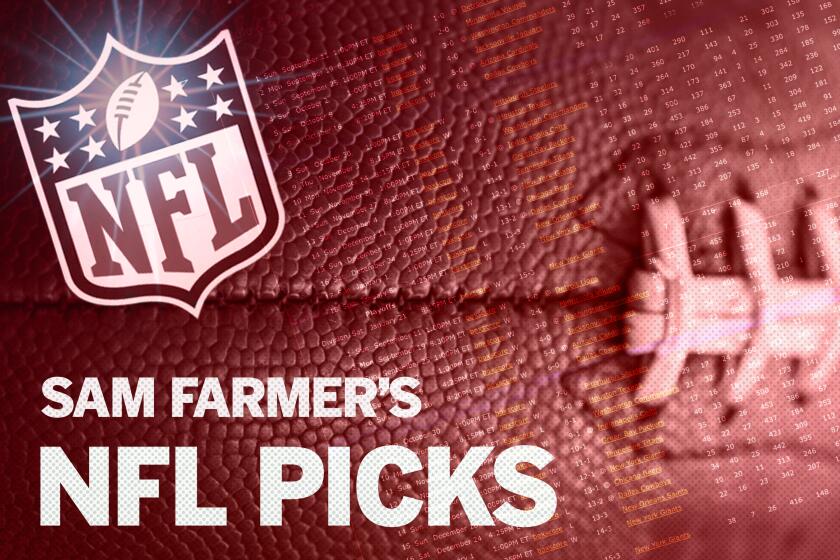Is Justin Herbert the next Philip Rivers for Chargers? ‘He doesn’t play like a rookie’

- Share via
He was asked about the Chargers’ new offense this season, an offense that is expected to be more ground-bound.
Defensive end Joey Bosa did not hesitate before launching into an answer that offered a counterpoint.
“Who knows?” he said. “Maybe Herbert’s going to be an absolute beast out there, throwing dimes left and right, and we could end up relying on his arm more and more throughout the year.”
At this point, Bosa was reminded that Justin Herbert isn’t the Chargers’ current starting quarterback.
The NFL’s highest-paid defensive player of all time then went on the offensive, apologizing to Tyrod Taylor and trying to laugh off a funny yet awkward moment.
Here was a normally charging defensive end, a celebrated pass-rushing machine, suddenly backpedaling like a frantic free safety.
That’s where the Chargers stand at football’s most important position as the 2020 season opener approaches.
They are in full transition, from one franchise icon in Philip Rivers to potentially their next franchise icon in Herbert.
An in-depth look at the Rams, Chargers and the rest of the NFL ahead of the 2020 season.
In between is Taylor, a 10th-year veteran who backed up Rivers last season and will be given the chance to lead a team many observers project as a playoff contender.
If Taylor succeeds and the Chargers win, Herbert might not play a meaningful snap all season. If Taylor and the Chargers fail, Herbert and the franchise’s future could arrive sooner than scheduled.
“We’re trying to develop a quarterback, but a lot of these young guys are trying to develop,” coach Anthony Lynn said. “Yes, we want to win at the same time. I understand that we can’t rush this process.
“It’s going to come to Justin. He’s an extremely hard-working young man. I like where he’s at right now with his development. ... If he continues this way, then he’s going to be just fine.”
In April, Herbert was the sixth overall pick in the NFL draft, a lofty position that brought with it a guaranteed $26.5-million investment and all the expectations attached to that sort of dollar figure.
Soon after, he was so eager to begin his professional career that Herbert drove from his family’s home in Oregon to Orange County to work with a local quarterback coach during a pandemic that, at times, threatened to shut down all of society.
He traveled a great distance to work on many things, not the least of which was something as basic as the football itself: receiving a snap from center.
In four years at Oregon, Herbert threw 1,293 passes. Every one of them originated from the shotgun formation.
Of the first 10 snaps in Herbert’s first practice of his first NFL training camp, eight came from under center. Each exchange was flawless.

“You hardly ever see Justin throw a ball that’s not a tight spiral. He has the ability to attack the entire field with the arm talent that he has.”
— Pep Hamilton, Chargers quarterbacks coach
“He has surpassed my expectations in fundamentally acclimating to the pro game,” Chargers quarterbacks coach Pep Hamilton said. “He did an excellent job over the summer of working on things that would be expected once he got here.”
In college, Herbert was known for his strong arm and fleet feet. At 6 feet 6 and 236 pounds, he is one inch taller and a few pounds lighter than Cam Newton, a quarterback so large that former NFL defensive tackle Gerald McCoy once said Newton should be ruled illegal for the position.
Appearance-wise, Hamilton said Herbert reminds him of Vinny Testaverde, who is 6-5 and spent two decades as an NFL quarterback. As with Testaverde, Herbert possesses what Hamilton called “a very efficient throwing process.”
“You hardly ever see Justin throw a ball that’s not a tight spiral,” Hamilton said. “He has the ability to attack the entire field with the arm talent that he has.”
That talent will be on display at some point for Chargers fans, though no one can be certain when that point will arrive.
Rivers sat for two years before he started. Patrick Mahomes started one game as a rookie. Dak Prescott, Carson Wentz, Russell Wilson and Matt Ryan all started from the first snaps of their first seasons.
Herbert had his moments during his initial NFL training camp, hitting tight end Stephen Anderson on a streaking seam route one day and another day zipping a ball to fellow rookie Joe Reed through the slightest of windows.
“He does a heck of a job of staying in the pocket when the pressure’s coming,” offensive coordinator Shane Steichen said. “He hasn’t flinched yet. So that’s a big sign of success down the road as he continues to grow in the system and in this league.”
Said defensive coordinator Gus Bradley, “He doesn’t play like a rookie quarterback.”
Oftentimes after practice, Herbert and fellow backup Easton Stick would remain on the field, tossing passes into nets and attempting to perfect their footwork.
An in-depth look at the Rams, Chargers and the rest of the NFL ahead of the 2020 season.
These sorts of quiet moments are a long way from Sunday afternoons at SoFi Stadium but also necessary steps to get there.
For now, it’s Taylor starting and Herbert waiting in a Chargers quarterback room where the present and the future must coexist.
“It’s all love,” Taylor said. “We’re on the same team. We’re trying to accomplish the same goal ... just natural competition and everyone bringing their best game. That’s good for our room, good for our offense and good for our team.”Chargers’ first-round quarterbacks
Justin Herbert is the fourth quarterback drafted by the Chargers in the first round. Here’s a look at the other picks:
ELI MANNING
2004, first overall pick
Manning refused to play for the Chargers, so he was immediately traded to the New York Giants for the third overall pick: Philip Rivers. Rivers and Manning led their teams to six playoff appearances over 16 seasons, but Manning came away with two Super Bowl victories.
RYAN LEAF
1998, second overall pick
Perhaps the most famous bust in NFL draft history, Leaf dropped to the Chargers at second overall after Indianapolis took Peyton Manning with the first pick. Leaf threw 13 touchdowns and 33 interceptions in two seasons before the Chargers released him. A few other teams gave Leaf a shot, but he never found success and retired before the start of the 2002 season.
MARTY DOMRES
1969, ninth overall pick
Domres was never more than a backup in three years with the Chargers. He was ultimately traded to Baltimore, where he took over for an aging Johnny Unitas.
— Jason Clark
More to Read
Go beyond the scoreboard
Get the latest on L.A.'s teams in the daily Sports Report newsletter.
You may occasionally receive promotional content from the Los Angeles Times.








